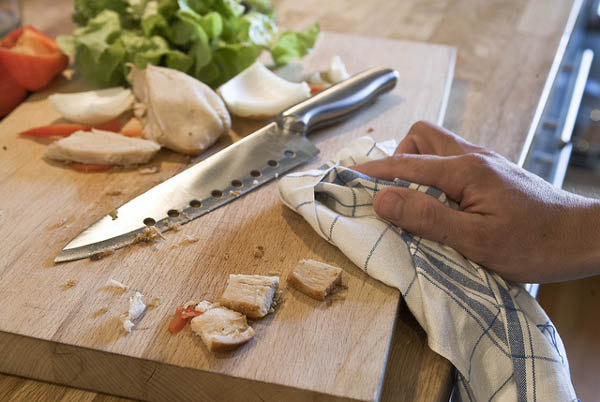Whether you see yourself as a top-notch cook or you only venture into the kitchen to pop a ready meal in the microwave, you should make sure your kitchen stays as clean as possible if you want to stop the spread of germs. You’ll probably have seen more than a few adverts on the TV that seem to use scare tactics to make you buy disinfectant products and the like, but the fact is that germs in the kitchen can lead to some pretty serious infections.
Salmonella, for example, can cause some nasty side-effects such as diarrhoea, sickness and abdominal pain and is found in contaminated foods. It can be spread by touching these foods and then other surfaces in the kitchen without washing your hands.
Another bacteria stemming from contaminated food is listeria, and this is the one that causes genuine food poisoning – it’s often found in cheese that’s gone mouldy.
E-coli is one of the most commonly found bacteria in the kitchen and it’s found in raw meat, so if you handle raw meat and then open the fridge door, for instance, there’s a good chance you’ll have spread it.
So, if you want to stop your kitchen from becoming a veritable hotbed of germs and bacteria, here are a few tips you might want to employ:

1. Wipe surfaces every day
It might sound like a bit of a chore, but wiping your surfaces every day will zap those germs right out of existence. You can use a germ-blasting kitchen spray and a cloth to do it and all you need to do is go around your kitchen after you’ve finished cooking or before you settle in for the night so you know it’s been done. Remember to dry the surfaces afterwards though as bacteria usually can’t survive in dry conditions.
2. Always wash your hands
Even if you’re a vegetarian you should wash your hands both before and after handling food – this way you can be sure you won’t be spreading any germs. When cleaning your kitchen always wipe down the taps and sink to catch any stray germs as well.
3. Use a chopping board
If you prepare meat or other items directly on your work surface you’ve no idea what could soon be crawling all over your dinner, and wiping the surface later on will have allowed the germs to multiply by an astronomical amount. Use a chopping board instead and wash it up immediately.
4. Do the washing up
Leaving your washing up for weeks on end is like opening the door to the germs and inviting them in for a cup of tea. Don’t give them the perfect habitat they need to survive and instead wash dishes on a nightly basis to stop the germs from having babies. Also, use a good-quality washing-up liquid that can kill them instantly.
5. Replace washcloths and sponges
Everyone has a washcloth or a sponge sitting on their sink at home and this is often the prime location for bacteria, which means every time you do the washing up you’re just spreading them around. To stop this, allow your cloths and sponges to dry and replace them often. You should also disinfect them by soaking in cleaning solutions or by putting them in the washing machine. After using sponges and cloths make sure you remove all bits of food to stop it from rotting and spawning bacteria.
6. Throw out out-of-date food
You should check your kitchen cupboards, fridge and freezer for out-of-date food on a regular basis to make sure none of it could potentially be a bacteria haven – remember the listeria?
How do you keep your kitchen clean?

